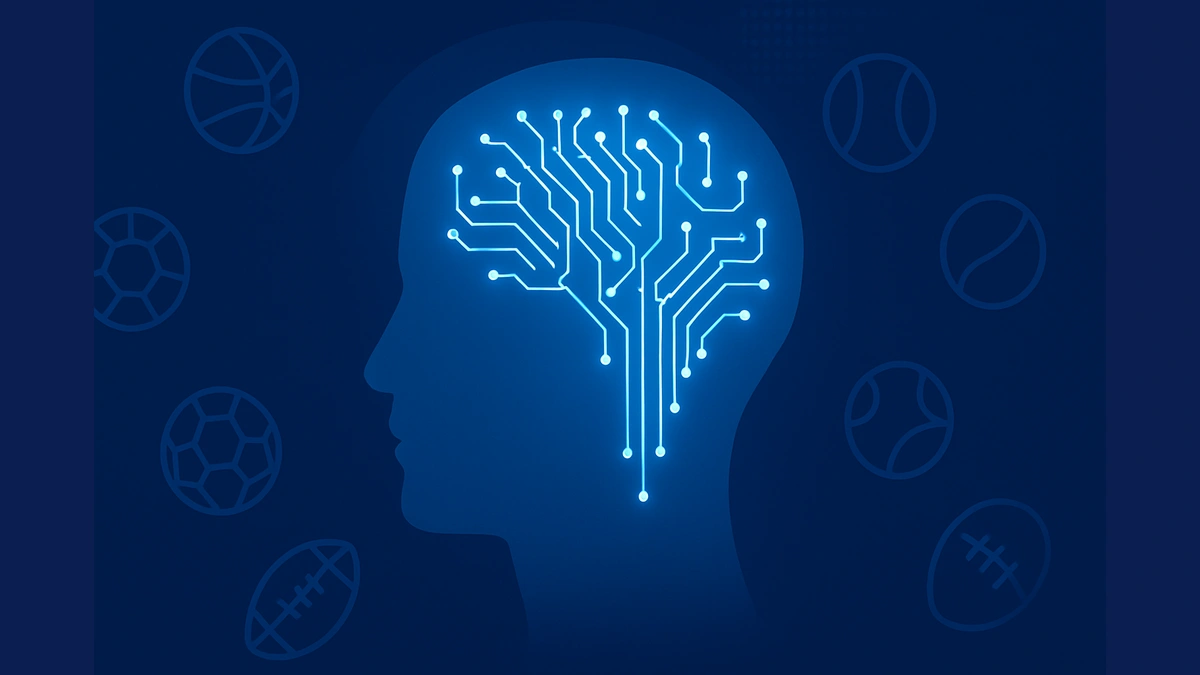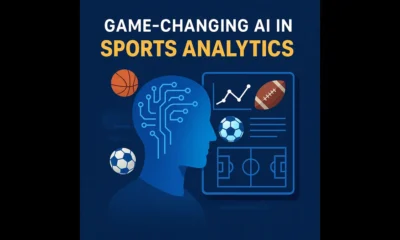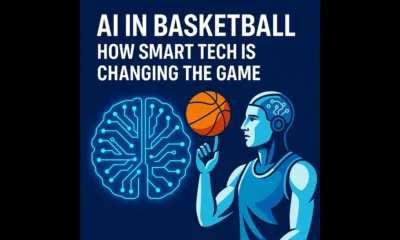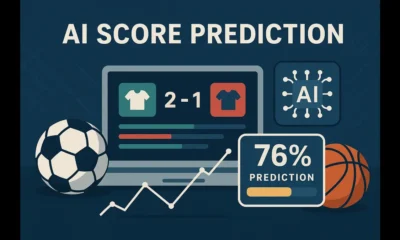
Imagine the final moments of a tense championship game. The score is tied, and the pressure is intense. With only seconds left, the coach gets a bold AI-generated play suggestion. While this story is made up, it shows what generative AI could do in sports. The team follows the AI’s advice, pulls off a perfect play, and wins the game. This example isn’t just about one victory—it shows how generative AI in sports is changing the game from the inside out.
Over the last decade, AI has become increasingly central to how athletes train, how games are played, and how fans engage with sports. Now, a new shift is happening as generative AI enters the scene. This technology is changing everything from strategy and betting insights to the way fans experience sports.
What’s in this article?
What Is Generative AI and Why It Matters in Sports
Before we examine how it’s used, let’s define what generative AI is. Simply put, generative AI encompasses models like ChatGPT or DALL·E, which not only analyze data but also create content. This content may include text, video, simulations, predictions, or voice commentary.
This differs from traditional AI in sports, which typically focuses on pattern recognition and decision-making, such as detecting fouls or tracking player movements. Generative AI brings creativity and strategy, making it a great fit for the fast-paced, story-driven world of sports.
Real-World Adoption: How Widely Is Generative AI Used Today?
While still an emerging technology, generative AI has already found its way into major sports ecosystems. Top European football clubs are experimenting with AI-generated scouting reports and tactical models. The NBA and MLB have partnered with analytics companies to pilot generative tools for scheduling, broadcast enhancements, and fan engagement. Broadcasters like ESPN and DAZN are also testing AI-powered commentary and automated highlight generation for lower-profile games that lack human coverage.
At the same time, not everyone is adopting AI at the same pace. Top teams with bigger budgets are usually the first to try new tools, while smaller leagues often use third-party services that make AI more affordable. In short, generative AI is moving from theory to practice and is now showing up in training centers, media booths, and betting platforms.
Real-World Use Cases of Generative AI in Sports
So, what does this mean for fans, analysts, and athletes? Let’s explore where generative AI is already making an impact:
- Predictive Match Content
Platforms like TigerSport.ai utilize generative models trained on historical game data, player statistics, and weather conditions to generate detailed, personalized match previews. These previews do more than just share basic facts; they highlight possible key players, injury risks, and tactical changes.
- Training Simulations and Injury Modeling
Coaches and sports scientists can use synthetic data, which are generated scenarios based on real-world inputs, to simulate thousands of possible in-game situations. (Hsieh, 2019) For example, they can see how a striker might react to a high press late in a match during heavy rain. Generative AI makes this possible.
It also plays a key role in injury prevention. By modeling various physical stresses and biomechanical patterns, it predicts potential breakdown points before they occur.
- AI-Powered Commentary and Journalism
Generative AI can use natural language generation to automatically create post-match reports, player interviews, and even commentary. (Gutterman, 2025) While it can’t fully replace human emotion, it’s a helpful tool for providing real-time updates, especially for leagues and teams that receive limited coverage.
Generative AI in Sports Analytics
AI has transformed sports analytics by turning data into valuable insights. In the past, analytics focused on tracking stats, player heatmaps, and team habits. Generative AI takes this further, providing even deeper understanding.
Smarter Coaching Decisions
If you give a generative model your opponent’s last 50 matches, it can simulate different playstyles against your team’s setup and create game plans from those results. (Wu, 2021) This gives coaches strategic insights that were once out of reach.
If you give a generative model your opponent’s last 50 matches, it can simulate different playstyles against your team’s setup and create game plans from those results. While this provides coaches with strategic insights that were once out of reach, Benjamin Alamar, author of Sports Analytics: A Guide for Coaches, Managers, and Other Decision Makers, notes that it is important to acknowledge the limitations inherent in the data being used. Factors such as data sparsity or modeling errors can influence outcomes, making it crucial to balance AI-generated strategies with human intuition and expertise.
Fatigue and Substitution Planning
AI does more than just respond to data. It can now predict fatigue patterns, estimate injury risks, and recommend the best times for substitutions. This is especially important in tournaments with busy schedules.
Game Outcome Predictions
By combining historical context, current form, and real-time match conditions, generative AI can simulate game outcomes thousands of times. These simulations are the foundation for prediction engines and betting algorithms.
Generative AI in Sports Betting
One of the biggest and most debated changes is the use of AI in sports betting. With so much data and close odds, AI helps make betting smarter, safer, and more tailored to each person.
Dynamic Odds Modeling
Bookmakers have always used data to set odds. Now, generative AI can simulate countless match outcomes based on small changes, such as a player’s recovery status. This lets odds adjust in smarter and more transparent ways. (Thorpe, 2024)
Personalized Betting Insights
Instead of offering the same odds to everyone, AI can suggest bets that match your risk level, betting history, and favorite teams. It’s like having a data expert to help you, but without the need for spreadsheets.
Responsible Gambling Support
AI can also spot risky behavior. If someone is chasing losses or betting in an unusual way, AI can intervene by automatically sending pop-up messages or alerts to encourage responsible behavior. These reminders might suggest taking a break or modifying betting limits for a short period. In more severe cases, the system can apply temporary account locks to prevent further risky betting activities. To ensure user data privacy, these AI systems employ robust encryption and strict data management protocols, safeguarding users’ personal and financial information. This makes betting not only smarter, but also safer.
Fan Engagement and Media Personalization
Sports are full of emotion and personal connections. Generative AI uses this to create experiences that feel tailored to each fan.
AI-Generated Highlight Reels
Platforms can now create custom highlight reels based on your favorite player or type of play, like all of Haaland’s headers. These clips are automatically edited, narrated, and sent to you almost instantly.
Fantasy Sports Content
AI can create fantasy football reports, recommend changes to your roster, and run ‘what if’ scenarios, such as how your team might have done if you had chosen a different captain.
Voice and Chat Interactions
Curious about how your team compares to an upcoming rival? Now you can ask AI-powered assistants, which can discuss form guides, tactics, and prediction chances in detail.
Fan Experience: How Can Everyday Fans Benefit?
Fans don’t need access to professional training centers to experience generative AI. Everyday sports followers are already using it in subtle but powerful ways:
- Personalized Match Feeds: Many sports apps now generate summaries, stats, and highlights tailored to a fan’s favorite teams or players.
- Custom Visual Content: Fans can create AI-generated posters, memes, or fantasy scenarios featuring their sports heroes.
- Smarter Fantasy Play: Fantasy platforms use generative AI to suggest transfers or captain picks based on predictive simulations.
- Interactive Chatbots: Supporters can “talk” to AI assistants for real-time updates, tactical breakdowns, or even fun trivia during live matches.
In short, generative AI lets fans do more than just watch. It makes following sports more interactive, personal, and engaging.
Challenges and Ethical Considerations
However, there are challenges to consider. The growth of generative AI raises some important ethical questions:
Data Bias
AI models are only as good as the data they’re trained on. If historical data is biased(e.g., underrepresenting certain leagues or players), the output will reflect that. For instance, a study revealed that during early trials, predictive models favored established leagues over emerging ones, leading to skewed match outcome predictions.
Transparency and Trust
Especially in AI in sports betting, transparency is vital. How was this prediction made? What data was used? Clear communication is crucial for establishing trust among users.
Some worry that automated journalism or coaching advice could take away from human roles. Most experts, though, believe AI should help, not replace people. The best results come when human knowledge and AI work as a team.
The Future of Generative AI in Sports
Looking to the future, the possibilities are huge:
- Real-time Tactical Adjustments: AI-generated recommendations pushed to coaching tablets during live matches.
- Augmented Reality Experiences: Imagine watching a game with AI overlays highlighting predicted passing lanes or shot probabilities.
- Cross-sport Insights: Generative AI could study techniques from different sports, such as helping a rugby player learn from American football or a tennis player improve using baseball strategies.
What Does Generative AI in Sports Mean for You?
Generative AI in sports is more than a passing trend. It’s changing how games are played, watched, and analyzed. Whether it’s smarter betting, safer training, or more personal content and tactics, it gives fans and professionals a real edge.
The future of sports will be shaped by both people and technology. That’s a partnership worth cheering for.
Want to see AI in action? Check out live predictions, insights, and smarter betting tools at TigerSport.ai, where data and passion come together.













